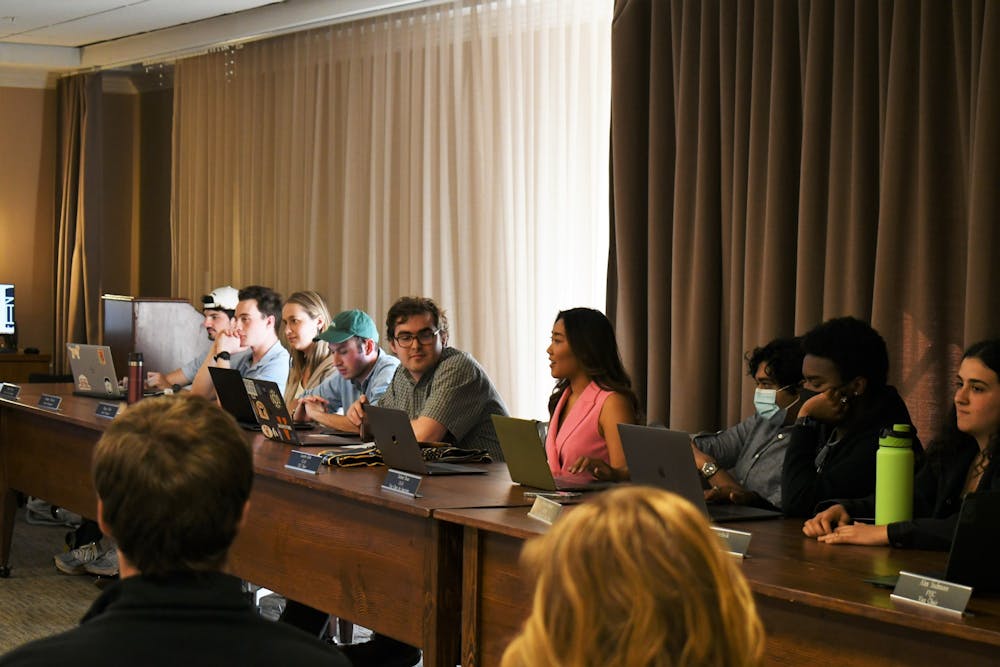The University Judiciary Committee met Sunday to bid farewell to graduating members and transition power to newly-elected Executive Committee members for a one-year term that began April 1.
Lauren Kim, outgoing chair of UJC and fourth-year College student, addressed the membership body with a State of the Committee speech, during which she thanked members for their year-long efforts and spoke on the organization’s successes during her tenure. Kim will be succeeded by third-year College student Nabeel Raza.
The University Judiciary Committee is a student-led organization tasked with investigating and adjudicating violations of the University’s Standards of Conduct. UJC handles both cases involving individual and organizational violations of University policies and holds the authority to issue multi-sanction punishments ranging from a written letter of apology to suspension and expulsion from the University. UJC is comprised of 27 representatives chosen separately across each school at the University — who serve as trial judges for UJC trials — and a five-member voting Executive Committee which oversees the operations of the Committee.
She began her speech by extending congratulations to fellow graduating members, as well as each member of the executive committee. Kim thanked Marsh Pattie, assistant vice president of student affairs and UJC advisor, for his wisdom and the general body for allowing her to serve as chair.
“It’s been an honor of a lifetime,” Kim said.
Kim recapitulated UJC’s accomplishments during her term — accomplishments that Kim said were ever more impressive given that the executive committee entered into the term in the middle of the COVID-19 pandemic and had to shepherd the organization back to a sense of returning to normalcy as conditions improved.
“[When] my term started, I faced a semester docket of over 50 cases and overstaffed and very worn out membership, tense relations with U.Va. staff members and an uncertain future,” Kim said.
In the face of these challenges, Kim said she chose a theme of “restoration and longevity” for her term. Kim focused her efforts on improving connections amongst UJC members through establishing mentor relationships and bonding events.
Along with efforts to build internal cohesion, Kim sought to strengthen the UJC’s role as an organization whose mission extends beyond punishment to restoring harms committed by members of the University community.
“We are educational, and we showed our heart of restorative justice in every interaction,” Kim said. “We assisted hundreds of students to repair the harm that they or their organizations [had] and lifted communities.”
To increase the visibility of cases, the UJC released its first-ever organizational case report this term. The report outines all cases filed against student organizations in the past decade. Per the report, UJC has adjudicated 20 cases within the past decade — 17 of which were adjudicated after the onset of the COVID-19 pandemic.
Notably, UJC also updated its bylaws this year to expand the number of College of Arts and Sciences representatives from three to five. The referendum was passed in March, with 82.3 percent of students voting in favor. Previously, only the College of Arts and Sciences held three representative seats, with each of the other 12 schools holding two. The referendum allocated five seats to the College due to its large size proportional to the other schools.
Kim spoke on educators’ success in communicating this change to the community during a “highly visible season.” Educators are tasked with assisting guilty students and informing the University population of UJC policy.
This term, UJC also altered its meeting schedule so that the general body meets every other week instead of weekly, and the smaller pools of support officers — which include educators, investigators, and counselors — meet during the weeks in between. Kim said she thinks this change served as a source of increased productivity.
Under Kim’s leadership, UJC also codified the roles of subcommittee heads in order to clarify the responsibilities of each position. UJC currently has two standing subcommittees — its diversity, equity and inclusion group, which analyzes the demographics of UJC and supports students of color, and its history group, which is preparing a report on UJC’s journey since its creation in 1955.
This past term, Kim worked to create a working mental health subcommittee in response to the large increase in workload due to the quantity of COVID-19 cases. The group informed UJC members of available resources and collaborated with the Maxine Platzer Lynn Women’s Center to provide external training.
Looking to the future, Kim expressed her hopes to collaborate with the Alumni Association to expand endowments to UJC and facilitate a larger network of UJC alumni.
Kim closed her address with an affirmation of her belief in the UJC’s central mission to facilitate the restoration of justice on Grounds and lead the student body to follow the University’s Standards of Conduct.
“As we enter the next term, I'm optimistic,” Kim said. “I have confidence that our desire to care for each other will never change. Now and forever, I believe in our ability to be problem solvers. Seekers. Leaders … Never forget that to serve is the greatest reward.”







